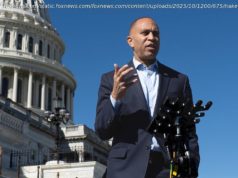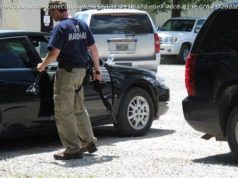A woman who has accused President Donald Trump’s Supreme Court nominee Brett Kavanaugh of sexual assault decades ago has not yet agreed to testify at a U. S. Senate hearing set for next Monday, raising questions about whether the high-stakes public showdown will take place.
WASHINGTON (Reuters) — A woman who has accused President Donald Trump’s Supreme Court nominee Brett Kavanaugh of sexual assault decades ago has not yet agreed to testify at a U. S. Senate hearing set for next Monday, raising questions about whether the high-stakes public showdown will take place.
Christine Blasey Ford, a university professor in California whose allegations have put Kavanaugh’s once-safe nomination in jeopardy, has not responded to attempts by the Republican-led Senate Judiciary Committee to contact her about appearing at the hearing, committee Chairman Chuck Grassley said on Tuesday.
Trump stepped up his defense of Kavanaugh and expressed sympathy toward his nominee, who met with officials at the White House for a second straight day though not with the president.
“I feel so badly for him that he’s going through this, to be honest with you,” Trump told a news conference. “… This is not a man that deserves this.”
“Hopefully the woman will come forward, state her case. He will state his case before representatives of the United States Senate. And then they will vote. They will look at his career. They will look at what she has to say, from 36 years ago, and we will see what happens,” Trump added.
The hearing represents a potential make-or-break moment for the conservative federal appeals court judge’s confirmation chances for the lifetime post on the top U. S. court, as Trump seeks to continue his goal of moving the federal judiciary to the right.
Grassley, whose committee oversees the confirmation process, initially said the planned hearing would be public but other Republicans indicated it could be held privately if Ford requests that.
Ford has accused Kavanaugh of trying to attack her and remove her clothing while he was drunk in 1982 in a Maryland suburb outside Washington when they were students at different high schools. Kavanaugh has called the allegation “completely false.”
Republicans control the Senate by only a narrow margin, meaning any defections in the party could sink the nomination and deal a major setback to Trump.
Senator John Cornyn, a member of the Senate Republican leadership, appeared to cast doubt on Ford’s allegations.
“We just don’t know what happened 36 years ago and there are gaps in her memory. She doesn’t know how she got there, when it was, and so that would logically be something where she would get questions,” Cornyn told reporters.
His fellow Republicans have generally avoided criticizing Ford, instead casting blame on Democrats for not revealing her allegations earlier.
Chuck Schumer, the top Senate Democrat, urged Trump’s fellow Republicans not to “rush the hearings.”
Democrats, already fiercely opposed to the nominee, wrote a letter to Grassley objecting to the planned format of the hearing, which was announced on Monday, including having just Kavanaugh and Ford as witnesses.
“We have reached out to her in the last 36 hours, three or four times by email, and we’ve not heard from them. So it kind of raises the question… do they want to come to (the) public hearing or not?” Grassley said in an interview with conservative radio host Hugh Hewitt. ‘DESERVES TO BE HEARD’
“I want to hear from Dr. Ford,” Grassley said. “And she deserves to be heard because these are serious accusations. And I would surely hope she’d come Monday.”
Ford detailed her allegation in a letter sent in July to Senator Dianne Feinstein, the committee’s top Democrat. The letter’s contents leaked last week and Ford identified herself in an interview with the Washington Post published on Sunday that included details about the alleged assault.
The committee announced on Monday it would postpone its planned vote on Thursday on Kavanaugh’s nomination, which requires Senate confirmation, and scheduled the hearing for the nominee and his accuser to testify.
Debra Katz, a lawyer representing Ford, said in television interviews on Monday that the professor would be willing to testify and called the alleged incident “attempted rape.” Katz did not respond to Reuters requests for comment.
Republican staffers quizzed Kavanaugh about the allegations on a call on Monday evening in which the Democrats refused to participate. Committee spokesman Taylor Foy said that other witnesses would be questioned ahead of the hearing.
Democrats have so far also refused to cooperate with the committee’s Republican leadership. They have asked that the FBI conduct an investigation, a request that Republicans have rebuffed. Trump and other Republicans said they do not think the FBI needs to be involved.
Feinstein said there should be more than just two witnesses, possibly to include people who Ford previously confided in. The committee Democrats said witnesses should include Kavanaugh’s friend Mark Judge, who Ford has said witnessed the incident.
The confirmation fight comes just weeks before the Nov. 6 congressional elections in which Democrats are seeking to take control of Congress from Trump’s party, which could be a major blow to the president’s agenda.
One Democratic senator, Richard Blumenthal, said Kavanaugh should withdraw his nomination.
“I believe Dr. Ford. I believe the survivor here,” Blumenthal said. “… She has come forward courageously and bravely, knowing she would face a nightmare of possible and vicious scrutiny.”
The showdown has echoes of Supreme Court Justice Clarence Thomas’ contentious confirmation hearings in 1991 involving sexual harassment allegations lodged against him by a law professor named Anita Hill. Thomas, the court’s second black justice, was ultimately confirmed, but only after a nasty televised hearing in which Hill faced pointed questions from Republican senators and the nominee said he was the victim of “a high-tech lynching for uppity blacks.”
Grassley offered his assurance that Ford would be treated respectfully and not badgered during the hearing.






